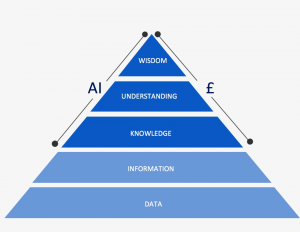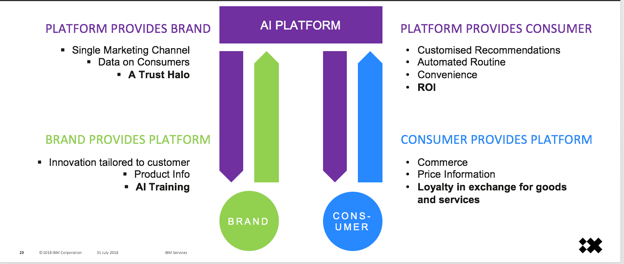Telco Media and Entertainment
Artificial Intelligence: a Step Change in Customer Engagement
28 August, 2018 | Written by: Andrew Crisp
Categorized: Telco Media and Entertainment
Share this post:
Experience. It’s been the buzzword on everyone’s lips for some time. Media and entertainment (M&E) companies want to create new content, make it available anywhere, anytime (sometimes real time) and make it personal. Telecom businesses want to offer a different set of services, move away from commodities, and in doing so set themselves apart with superior customer experiences. Many organisations think artificial intelligence is a key tool to help deliver on these strategies, but many organisations decide to adopt AI first and then search for a problem!
However, despite the very real hype, all too often those looking to improve customer experiences – be they CMOs, Product Managers or Digital Experience Directors – implement AI because it’s something they think they should be doing, not because it supports what they really should be doing. This approach usually fails to get the best results. Before you use AI to gain greater differentiation, you need the right foundations in place.
The good news is, the potential for cognitive computing to revolutionise the Telco and M&E industries is enormous. With the power to unleash a new era of innovation and growth, cognitive systems are already helping better understand audiences, refine advertising activities and improve service for customers, all of which aid in further enhancing the customer experience.
Furthermore, our research indicates that TME executives are poised to embrace this ground-breaking technology and invest. Of those executives surveyed:
- 86% believe it will play a disruptive role in the industry.
- 92% believe it will play an important role in the future of their business.
- 82% intend to invest in cognitive capabilities.
In my experience, there are four essential elements your business needs if it’s going to harness the full potential of artificial intelligence to enhance customer experience:
Strategy in the world of Artificial Intelligence
There’s nothing new in stating you need a strategy, so what’s different in the world of AI? First and foremost, decide the problem you want to solve. Do you want to understand your customers better, identify who the key influencers are, reduce costs or enhance your content? It’s critical that you apply AI in a targeted and specific manner.
A great example of using AI to deliver superb content is the All England Lawn Tennis and Croquet Club, host of the annual Wimbledon jamboree. With a sophisticated digital and social content strategy to support, Wimbledon has been reinventing itself as a media provider over the past few years. Facing competition this year from other summer sporting events – not least a certain football tournament in Russia – Wimbledon knew it needed to go the extra mile to deliver personalised, relevant and in-the-moment content.
AI had a big part to play in this – IBM Watson was used, for instance, to analyse audience reaction (taking its cues from social sentiment and spectators‘ facial expressions) to deliver highlights packages of the most exciting moments. Thanks to AI, a task that might previously have taken hours or even days, it was done in a matter of minutes!
Fox Sports did something similar with their FIFA World Cup Highlight Machine, offering a suite of AI compiled clips of World Cups past and present, which can be filtered by player and country. This proved to be a stand-out feature against rival broadcasters and was highly popular with viewers throughout the US.
The point is, these organisations had a strategy behind what they wanted to do with AI and how they were going to use it to differentiate, save cost, extend an existing market.
Data and Artificial Intelligence
Data is the bedrock of AI. Without it there is nothing to learn, it would be like having a classroom with no resources in it! For years, we have talked about structured and unstructured data, but we are truly in the age where we can make use of all that data, at pace and scale. What humans can consume, interpret and turn into recommendations in days, AI machines can do in seconds, in fact 10,000 records a second!
More than likely an organisation will claim to know their customers because they’ve implemented that market leading CRM system – and they might. But there is a huge difference between having a record of your customers and really knowing them.
The power of using AI is to take all the vast quantities of data and turn it into wisdom. (“oooh, if we change product A into product B and target this market, we’ll develop $xm in new revenue”)

As the diagram depicts, in the transition from knowledge to understanding to wisdom, the true value of AI starts to emerge and the ability to differentiate.
Platform and Artificial Intelligence
Now here’s a new buzz word! But what is an ‘AI platform’? You could think of an AI platform as the combination of people, tech and processes. It is a mechanism to bring together various sets of capabilities to create new markets and is the single route to communicate with your customers consistently (which in turn creates brand relevance, loyalty and value).

People and Artificial Intelligence
Too often the overarching assumption is that AI means we can reduce headcount….. WRONG!
Critical to AI is having a team with the right skills to make the most of it. A study by Forbes estimated that 85% of Digital Transformation projects fail (of which the application of AI is core) because of a lack of consideration about people. Talent, culture, roles, skills, structure……basically all the elements you need from your work force.
Learn more about how you can leverage AI today. Read the Call Center Study from IBM’s Institute for Business Value research team.

Executive Partner, Comms Sector Europe Digital Leader
Frontier Fusion: Accelerating the Path to Net Zero with Next Generation Innovation
Delivering the world’s first fusion powerplants has long been referred to as a grand challenge – requiring international collaboration across a broad range of technical disciplines at the forefront of science and engineering. To recreate a star here on Earth requires a complex piece of engineering called a “tokamak” essentially, a “magnetic bottle”. Our […]
Safer Technology Change in the Financial Services Industry
Many thanks to Benita Kailey for their review feedback and contributions to this blog. Safe change is critical in keeping the trust of customers, protecting a bank’s brand, and maintaining compliance with regulatory requirements. The pace of change is never going to be this slow again. The pace of technology innovation, business […]
Unlocking Digital Transformation in Government
As the UK government embarks on its digital transformation journey, the challenges of adopting new technologies such as artificial intelligence (AI) and data-driven solutions are becoming more evident. From managing public trust to overcoming fragmented systems, the path is complex. Blake Bower and Giles Hartwright review the unique obstacles that the government faces and […]


